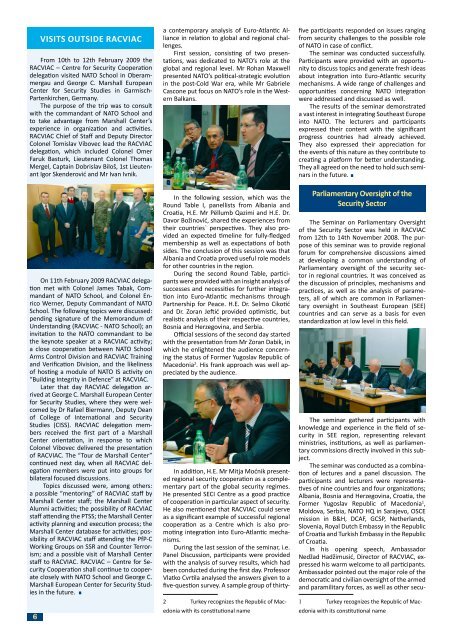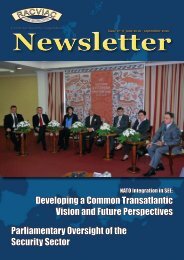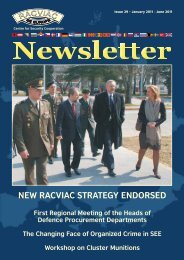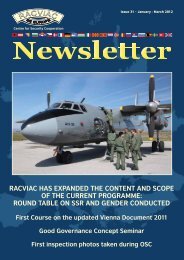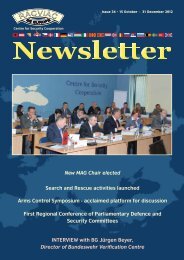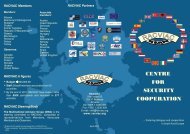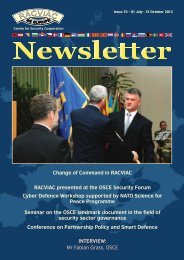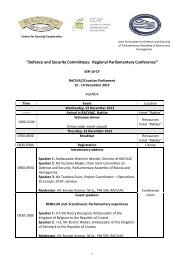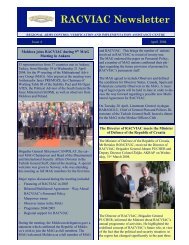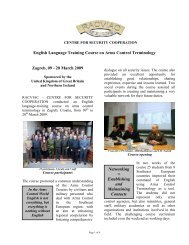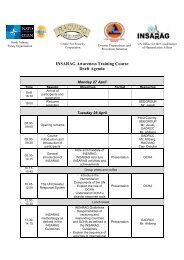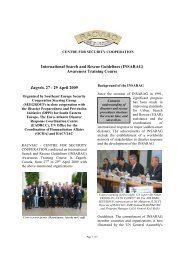20th MULTINATIONAL ADVISORY GROUP MEETING ... - RACVIAC
20th MULTINATIONAL ADVISORY GROUP MEETING ... - RACVIAC
20th MULTINATIONAL ADVISORY GROUP MEETING ... - RACVIAC
You also want an ePaper? Increase the reach of your titles
YUMPU automatically turns print PDFs into web optimized ePapers that Google loves.
Visits outside <strong>RACVIAC</strong><br />
From 10th to 12th February 2009 the<br />
<strong>RACVIAC</strong> – Centre for Security Cooperation<br />
delegation visited NATO School in Oberammergau<br />
and George C. Marshall European<br />
Center for Security Studies in Garmisch-<br />
Partenkirchen, Germany.<br />
The purpose of the trip was to consult<br />
with the commandant of NATO School and<br />
to take advantage from Marshall Center’s<br />
experience in organization and activities.<br />
<strong>RACVIAC</strong> Chief of Staff and Deputy Director<br />
Colonel Tomislav Vibovec lead the <strong>RACVIAC</strong><br />
delegation, which included Colonel Omer<br />
Faruk Basturk, Lieutenant Colonel Thomas<br />
Mergel, Captain Dobrislav Biloš, 1st Lieutenant<br />
Igor Skenderović and Mr Ivan Ivnik.<br />
On 11th February 2009 <strong>RACVIAC</strong> delegation<br />
met with Colonel James Tabak, Commandant<br />
of NATO School, and Colonel Enrico<br />
Werner, Deputy Commandant of NATO<br />
School. The following topics were discussed:<br />
pending signature of the Memorandum of<br />
Understanding (<strong>RACVIAC</strong> - NATO School); an<br />
invitation to the NATO commandant to be<br />
the keynote speaker at a <strong>RACVIAC</strong> activity;<br />
a close cooperation between NATO School<br />
Arms Control Division and <strong>RACVIAC</strong> Training<br />
and Verification Division, and the likeliness<br />
of hosting a module of NATO IS activity on<br />
“Building Integrity in Defence” at <strong>RACVIAC</strong>.<br />
Later that day <strong>RACVIAC</strong> delegation arrived<br />
at George C. Marshall European Center<br />
for Security Studies, where they were welcomed<br />
by Dr Rafael Biermann, Deputy Dean<br />
of College of International and Security<br />
Studies (CISS). <strong>RACVIAC</strong> delegation members<br />
received the first part of a Marshall<br />
Center orientation, in response to which<br />
Colonel Vibovec delivered the presentation<br />
of <strong>RACVIAC</strong>. The “Tour de Marshall Center”<br />
continued next day, when all <strong>RACVIAC</strong> delegation<br />
members were put into groups for<br />
bilateral focused discussions.<br />
Topics discussed were, among others:<br />
a possible “mentoring” of <strong>RACVIAC</strong> staff by<br />
Marshall Center staff; the Marshall Center<br />
Alumni activities; the possibility of <strong>RACVIAC</strong><br />
staff attending the PTSS; the Marshall Center<br />
activity planning and execution process; the<br />
Marshall Center database for activities; possibility<br />
of <strong>RACVIAC</strong> staff attending the PfP-C<br />
Working Groups on SSR and Counter Terrorism;<br />
and a possible visit of Marshall Center<br />
staff to <strong>RACVIAC</strong>. <strong>RACVIAC</strong> – Centre for Security<br />
Cooperation shall continue to cooperate<br />
closely with NATO School and George C.<br />
Marshall European Center for Security Studies<br />
in the future.<br />
6<br />
a contemporary analysis of Euro-Atlantic Alliance<br />
in relation to global and regional challenges.<br />
First session, consisting of two presentations,<br />
was dedicated to NATO’s role at the<br />
global and regional level. Mr Rohan Maxwell<br />
presented NATO’s political-strategic evolution<br />
in the post-Cold War era, while Mr Gabriele<br />
Cascone put focus on NATO’s role in the Western<br />
Balkans.<br />
In the following session, which was the<br />
Round Table I, panellists from Albania and<br />
Croatia, H.E. Mr Pëllumb Qazimi and H.E. Dr.<br />
Davor Božinović, shared the experiences from<br />
their countries` perspectives. They also provided<br />
an expected timeline for fully-fledged<br />
membership as well as expectations of both<br />
sides. The conclusion of this session was that<br />
Albania and Croatia proved useful role models<br />
for other countries in the region.<br />
During the second Round Table, participants<br />
were provided with an insight analysis of<br />
successes and necessities for further integration<br />
into Euro-Atlantic mechanisms through<br />
Partnership for Peace. H.E. Dr. Selmo Cikotić<br />
and Dr. Zoran Jeftić provided optimistic, but<br />
realistic analysis of their respective countries,<br />
Bosnia and Herzegovina, and Serbia.<br />
Official sessions of the second day started<br />
with the presentation from Mr Zoran Dabik, in<br />
which he enlightened the audience concerning<br />
the status of Former Yugoslav Republic of<br />
Macedonia 2 . His frank approach was well appreciated<br />
by the audience.<br />
In addition, H.E. Mr Mitja Moćnik presented<br />
regional security cooperation as a complementary<br />
part of the global security regimes.<br />
He presented SECI Centre as a good practice<br />
of cooperation in particular aspect of security.<br />
He also mentioned that <strong>RACVIAC</strong> could serve<br />
as a significant example of successful regional<br />
cooperation as a Centre which is also promoting<br />
integration into Euro-Atlantic mechanisms.<br />
During the last session of the seminar, i.e.<br />
Panel Discussion, participants were provided<br />
with the analysis of survey results, which had<br />
been conducted during the first day. Professor<br />
Vlatko Cvrtila analysed the answers given to a<br />
five-question survey. A sample group of thirty-<br />
2 Turkey recognizes the Republic of Macedonia<br />
with its constitutional name<br />
five participants responded on issues ranging<br />
from security challenges to the possible role<br />
of NATO in case of conflict.<br />
The seminar was conducted successfully.<br />
Participants were provided with an opportunity<br />
to discuss topics and generate fresh ideas<br />
about integration into Euro-Atlantic security<br />
mechanisms. A wide range of challenges and<br />
opportunities concerning NATO integration<br />
were addressed and discussed as well.<br />
The results of the seminar demonstrated<br />
a vast interest in integrating Southeast Europe<br />
into NATO. The lecturers and participants<br />
expressed their content with the significant<br />
progress countries had already achieved.<br />
They also expressed their appreciation for<br />
the events of this nature as they contribute to<br />
creating a platform for better understanding.<br />
They all agreed on the need to hold such seminars<br />
in the future.<br />
Parliamentary Oversight of the<br />
Security Sector<br />
The Seminar on Parliamentary Oversight<br />
of the Security Sector was held in <strong>RACVIAC</strong><br />
from 12th to 14th November 2008. The purpose<br />
of this seminar was to provide regional<br />
forum for comprehensive discussions aimed<br />
at developing a common understanding of<br />
Parliamentary oversight of the security sector<br />
in regional countries. It was conceived as<br />
the discussion of principles, mechanisms and<br />
practices, as well as the analysis of parameters,<br />
all of which are common in Parliamentary<br />
oversight in Southeast European (SEE)<br />
countries and can serve as a basis for even<br />
standardization at low level in this field.<br />
The seminar gathered participants with<br />
knowledge and experience in the field of security<br />
in SEE region, representing relevant<br />
ministries, institutions, as well as parliamentary<br />
commissions directly involved in this subject.<br />
The seminar was conducted as a combination<br />
of lectures and a panel discussion. The<br />
participants and lecturers were representatives<br />
of nine countries and four organizations;<br />
Albania, Bosnia and Herzegovina, Croatia, the<br />
Former Yugoslav Republic of Macedonia 1 ,<br />
Moldova, Serbia, NATO HQ in Sarajevo, OSCE<br />
mission in B&H, DCAF, GCSP, Netherlands,<br />
Slovenia, Royal Dutch Embassy in the Republic<br />
of Croatia and Turkish Embassy in the Republic<br />
of Croatia.<br />
In his opening speech, Ambassador<br />
Nedžad Hadžimusić, Director of <strong>RACVIAC</strong>, expressed<br />
his warm welcome to all participants.<br />
Ambassador pointed out the major role of the<br />
democratic and civilian oversight of the armed<br />
and paramilitary forces, as well as other secu-<br />
1 Turkey recognizes the Republic of Macedonia<br />
with its constitutional name


